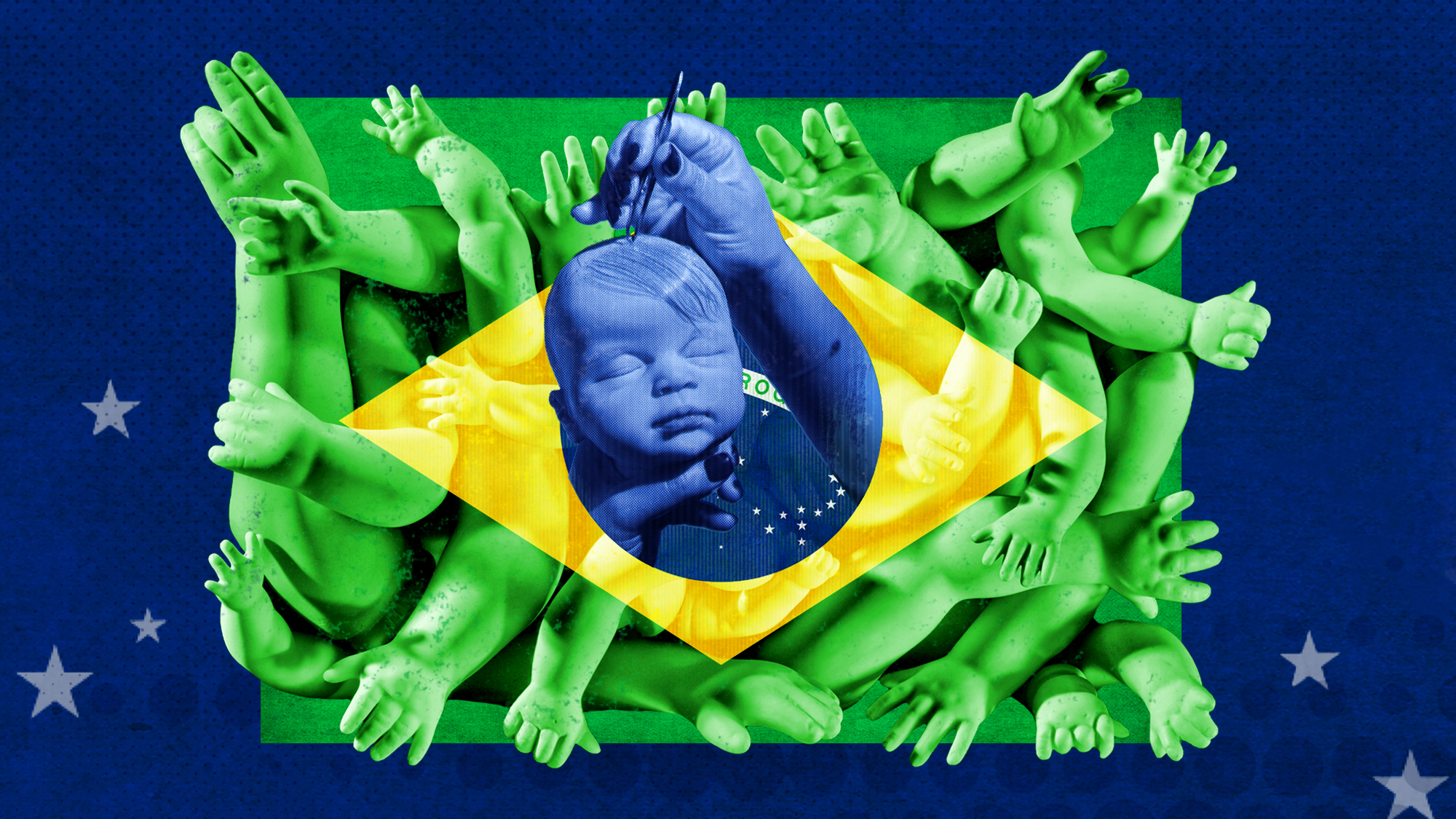Brazil's reborn dolls craze
The 'hyper-realistic' babies soaring in popularity in South American nation have spawned controversy

A free daily email with the biggest news stories of the day – and the best features from TheWeek.com
You are now subscribed
Your newsletter sign-up was successful
There's a surprising link between infants taken to hospital in Brazil seeking medical help and a baby taken into parliament by a Brazilian politician: they're not real.
Known as "reborn dolls", these "hyper-realistic" baby figures have taken off in the South American country, reported AP, but not everyone thinks this trend is healthy.
Eerie resemblance
If you "blink", you could "mistake" them for the real thing, said the South China Morning Post. Bearing an "eerie resemblance to an actual infant", the dolls "cry, suck dummies, pee, and have nails, eyelashes and veins". Unlike the "waxy, smooth complexion" of traditional dolls, they have realistically "puckered features and blotchy skin".
The Week
Escape your echo chamber. Get the facts behind the news, plus analysis from multiple perspectives.

Sign up for The Week's Free Newsletters
From our morning news briefing to a weekly Good News Newsletter, get the best of The Week delivered directly to your inbox.
From our morning news briefing to a weekly Good News Newsletter, get the best of The Week delivered directly to your inbox.
They first arrived in the United States in the early 1990s, "targeting adults chiefly", but in recent years their popularity has "rocketed" in Brazil. Costing from 700 reals (£91) to nearly 10,000 reals (£1,300), the dolls are used for grief therapy or parenting practice, said AP. A shop owner in Sao Paulo said that the popularity of the dolls, and the associated controversy, means they're "locking up the store more" and "adding cameras".
Online influencers have staged "birth simulations and strolls in shopping malls" with the hand-crafted baby figures, creating videos that have gone "viral". Last month, several dozen "reborn mothers" gathered at a park in Sao Paulo for a 10th annual meet-up, with their babies.
'Deranged' hobby
Social media has "erupted" in response to this trend, with posts "condemning" it as "deranged" or "dismissing it as a harmless hobby", said the South China Morning Post.
Some politicians have called for "reborn" mothers to be offered psychological help, but others are less compassionate, calling for punishments for people who allegedly use their "babies" to "jump the queue for public services".
A free daily email with the biggest news stories of the day – and the best features from TheWeek.com
One legislator, the evangelical pastor Manoel Isidorio, recently took his "granddaughter" to parliament and argued that playing with dolls is "not a sin".
Other collectors have weighed in. "I love reborns, despite the hate we see out there," Berenice Maria, a longtime collector who owns eight dolls, told AP. "I want the right to go out with them…go to the mall, go to the park."
Another collector, Gabi Matos, told the South China Morning Post that the criticism is sexist because "male hobbies like video games, flying kites, playing football are normalised" and "no one says that they are too old to do these things", yet women can't "take care of their dolls without people thinking we are sick".
Chas Newkey-Burden has been part of The Week Digital team for more than a decade and a journalist for 25 years, starting out on the irreverent football weekly 90 Minutes, before moving to lifestyle magazines Loaded and Attitude. He was a columnist for The Big Issue and landed a world exclusive with David Beckham that became the weekly magazine’s bestselling issue. He now writes regularly for The Guardian, The Telegraph, The Independent, Metro, FourFourTwo and the i new site. He is also the author of a number of non-fiction books.
-
 El Paso airspace closure tied to FAA-Pentagon standoff
El Paso airspace closure tied to FAA-Pentagon standoffSpeed Read The closure in the Texas border city stemmed from disagreements between the Federal Aviation Administration and Pentagon officials over drone-related tests
-
 Political cartoons for February 12
Political cartoons for February 12Cartoons Thursday's political cartoons include a Pam Bondi performance, Ghislaine Maxwell on tour, and ICE detention facilities
-
 Arcadia: Tom Stoppard’s ‘masterpiece’ makes a ‘triumphant’ return
Arcadia: Tom Stoppard’s ‘masterpiece’ makes a ‘triumphant’ returnThe Week Recommends Carrie Cracknell’s revival at the Old Vic ‘grips like a thriller’
-
 7 nightlife destinations that are positively electric
7 nightlife destinations that are positively electricThe Week Recommends Accra, Seoul, Berlin: These are a few of the cities that come alive after dark
-
 I'm Still Here: 'superb' drama explores Brazil's military dictatorship
I'm Still Here: 'superb' drama explores Brazil's military dictatorshipThe Week Recommends Fernanda Torres delivers 'phenomenal' performance as mother whose life is shattered by violence in the Oscar-nominated drama
-
 2025 Oscars: voters, record-breakers and precedent-setters
2025 Oscars: voters, record-breakers and precedent-settersThe explainer A walk through Academy Awards history, both past and present
-
 'Swimming in the sky' in northern Brazil
'Swimming in the sky' in northern BrazilThe Week Recommends The pools of Lençóis Maranhenses are clear and blue
-
 A beginner's guide to exploring the Amazon
A beginner's guide to exploring the AmazonThe Week Recommends Trek carefully — and respectfully — in the world's largest rainforest
-
 How to celebrate New Year's Eve globally without leaving home
How to celebrate New Year's Eve globally without leaving homeThe Week Recommends Stock up on grapes and (safely) set a scarecrow on fire
-
 7 captivating new UNESCO World Heritage Sites to explore
7 captivating new UNESCO World Heritage Sites to exploreThe Week Recommends These sites have cultural, historical and scientific significance and the international organization's fresh stamp of approval
-
 Make a splash at these 8 refreshing water parks
Make a splash at these 8 refreshing water parksThe Week Recommends Cool off while having a blast